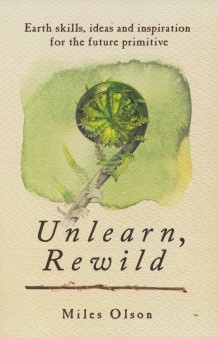A Rewilder’s Guide for Living Off the Grid
Miles Olson is an inspirational rewilder who lives and breathes the mechanics of rewilding. He has lived on the fringes of civilization for a decade. His stories have been inspiring me ever since I had the pleasure to sit around the same campfire with him some years ago. He has finally written a book that is an accumulation of techniques he has learned for what I would call off-grid, grassroots, punk rock rewilding.
Unlearn, Rewild is cleverly separated into two sections; “Ideas” and “Endangered skills”. The “Ideas” section covers exactly what you might think: all of the ideas that we must “unlearn” about ourselves if we are to live sustainably. This section reads very similarly to my book Rewild or Die, in that it covers the basic philosophy of rewilding. I was a bit concerned at first when it seemed that it was mirroring my work a little too closely. However, I was pleased to find that while the structure was similar to my book, the ideas were unique and Miles voice is different enough and intelligent enough to cover new ground. The ideas section has many gems. The chapters on being white, invasive species and the Fukushima disaster hit me on a very deep level. So many topics were pursued in brief, leaving me wanting more.
The second section, “Endangered Skills” focuses on aspects of skills that are generally not included in most field guides. This is the section that made the publisher describe the book as a “hardcore survival guide”. This was not my impression of Unlearn, Rewild. The book is less a “survival guide”, and more of a manual for rewilding off the grid: there are chapters on drying and storing food, setting traps, and folk medicine. Perhaps you might think of it as a “hardcore survival guide” if the idea of eating maggots sounds like something only a survivalist would do. But as Miles explains in his chapter on entomophagy (the practice of eating insects), “Traditionally, many cultures have relished maggots, leaving fish or meat out to become saturated with them and then eating the maggots raw. There is a logic to this: a diet of exclusively lean meat causes severe health problems, eventually leading to kidney failure and death.” This doesn’t seem like a hardcore survival technique to me–something you would only do to survive–it seems like the normal practice of everyday food gathering for a rewilder.
The “Endangered Skills” section is definitely strength of this book. The ideas are great, but without the section on the skills, many may be left uncertain as to how to go about rewilding. Miles has given people that feel inspired to rewild a roadmap. One that he charted himself through gleaning information from books and elders, and hard-won knowledge gained through his own personal experimentation. The beauty is, with Unlearn, Rewild you can jump lightyears ahead of where Miles had to start himself. This book is an essential addition to the rewilder’s library.


